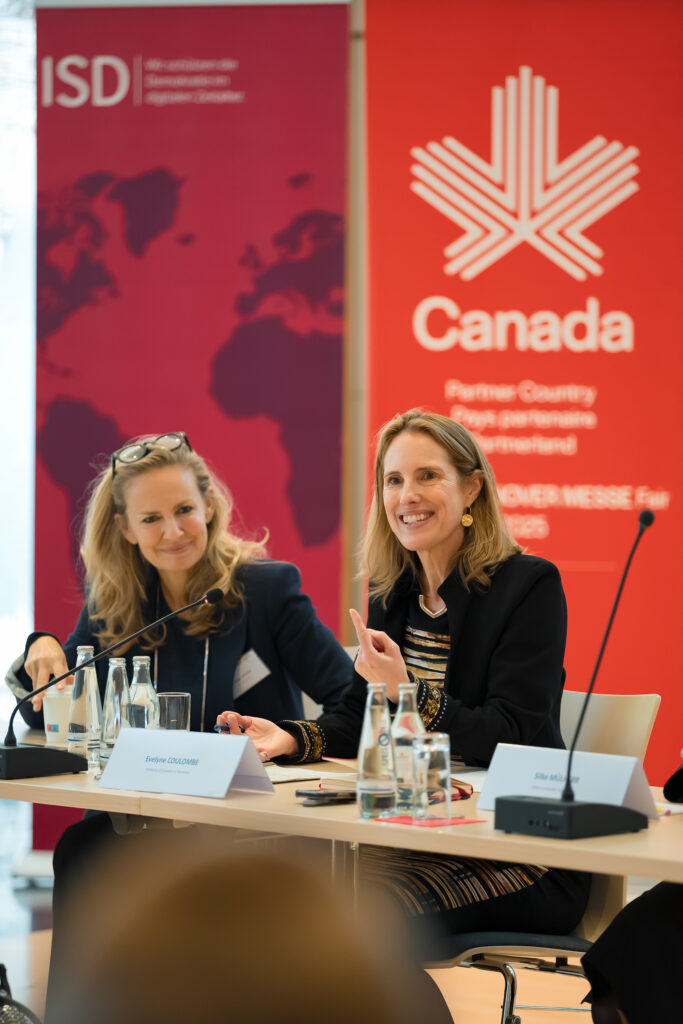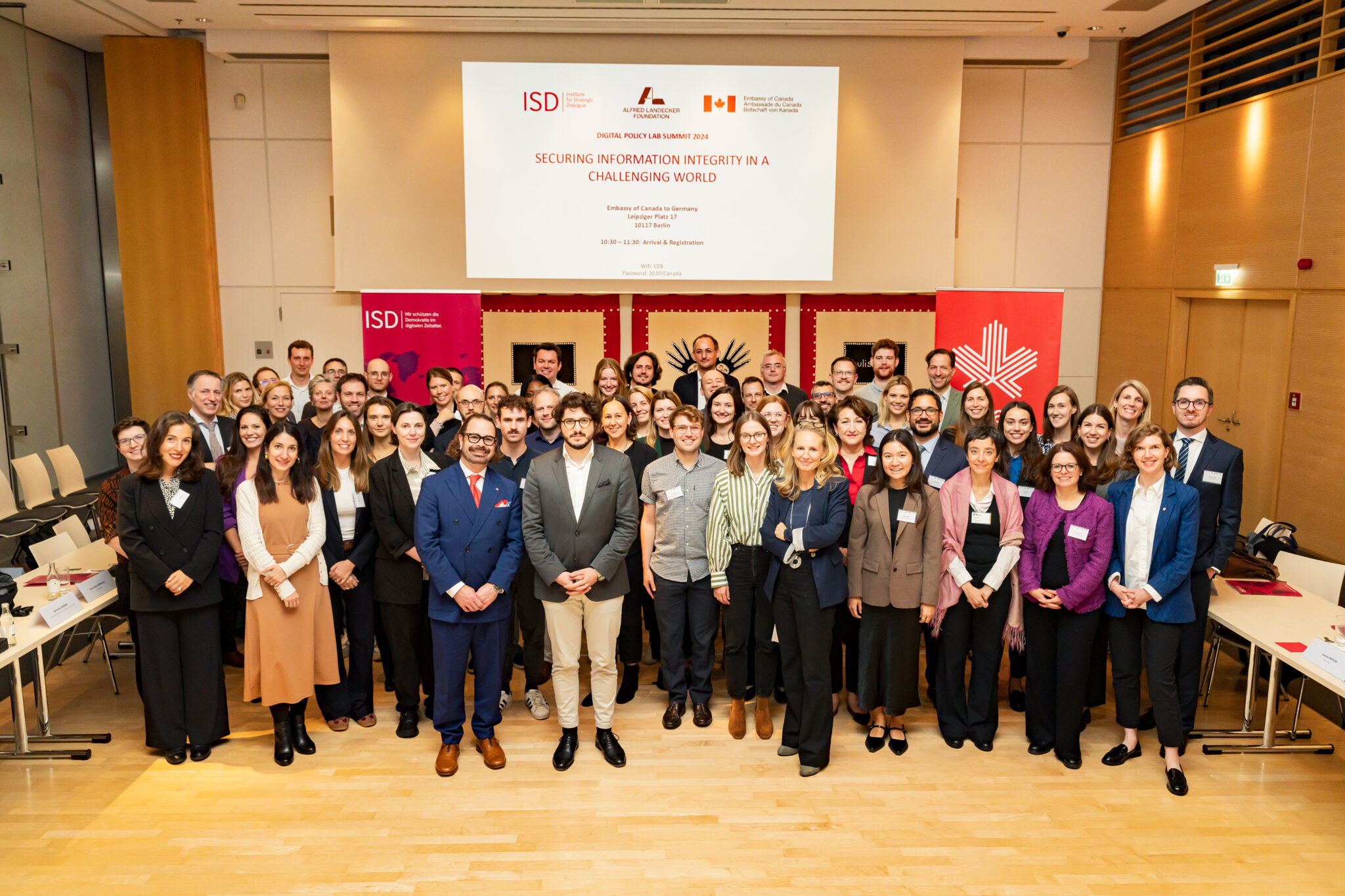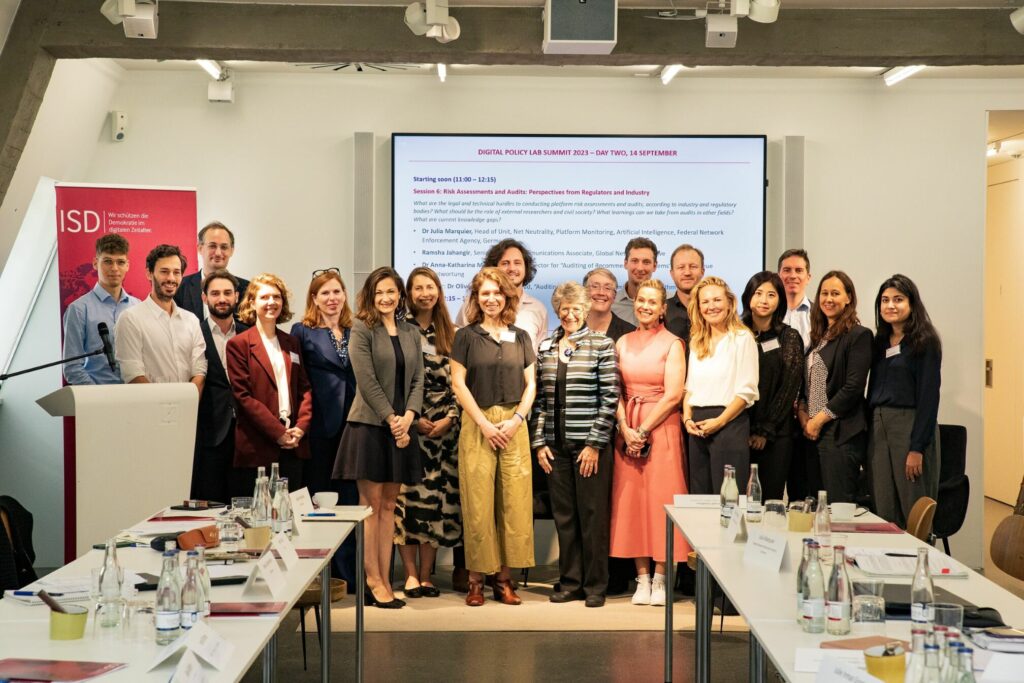Digital Policy Lab
ISD’s Digital Policy Lab brings together key policymakers to address disinformation, hate speech, extremism and terrorism online
The Digital Policy Lab (DPL) is an intergovernmental working group focused on charting the regulatory and policy path forward to prevent and counter disinformation, hate speech, extremism and terrorism online.
It comprises a core group of senior representatives of ministries and regulators from key liberal democratic countries. The DPL intends to foster intergovernmental exchange, provide policymakers with access to sector-leading expertise and research, and build an international community of policy practice around key regulatory challenges in the digital policy space.
Since launching in November 2020, the DPL network has brought together officials from 14 countries and the European Commission. Currently, the DPL includes representation from government agencies and regulators from Australia, Canada, France, Germany, Ireland, Italy, the Netherlands, New Zealand, Switzerland, Sweden, Slovakia, South Korea, the United Kingdom, the United States, and the EU Commission.
The DPL facilitates a structured dialogue with these senior representatives, through regular online sessions, convening working groups and co-producing policy briefs with DPL network participants. Once a year, the DPL Summit in Berlin provides an opportunity for in-person networking and an exchange of ideas.
We are grateful to the Alfred Landecker Foundation for their generous support of the DPL. From November 2020-2023, the DPL was funded by the German Federal Foreign Office. We remain grateful for their generous support.
The work of the Digital Policy Lab builds on ISD’s former initiative, the Policy Planners Network on Countering Radicalisation and Extremism (PPN), that ran from 2008 – 2019. The PPN worked to inform and enhance the strategies of its 12 governmental members through sharing of information and best practices for designing and implementing policies in countering terrorism, extremism and hate, both on- and offline.
DPL Summits:
In October 2024, ISD hosted the DPL Summit at the Canadian Embassy to Germany, bringing together global policymakers, regulators and experts to tackle online disinformation, hate speech and extremism. The Summit included representatives from the European Commission, Ofcom, the US Department of State, and EU Digital Services Coordinators from Belgium, Germany, Ireland and Slovakia. Discussions centred around regulatory compliance with frameworks such as the EU’s Digital Services Act and the UK’s Online Safety Act. Participants examined risk assessments, data access for researchers, and the implications of AI on online safety, especially regarding technology-facilitated gender-based violence (TGBV). Supported by the Alfred Landecker Foundation, the summit underscored ISD’s commitment to cross-border cooperation in protecting democratic values online.
This Summit builds on the success of previous events of the Digital Policy Lab and underscores ISD’s commitment to safeguarding democracy through robust, evidence-based digital policy. The 2023 DPL Summit convened over 50 network members in Berlin to discuss “Effective Strategies for Mitigating Digital Threats to Democracy.” High-level representatives from DPL countries gathered for two days to explore democratic responses to digital threats and the implementation of regulations. Key topics included data access and legal protections for researchers, assessing algorithmic risks, safety-by-design approaches, and regulating smaller platforms and emerging technologies. As digital threats continue to evolve, collaboration across borders remains critical.
DPL Working Groups and Policy Briefs:
Online working groups enable key topics to be discussed in more depth among a smaller group of interested DPL members and multi-stakeholder subject matter experts from civil society, academia and industry. These discussions provide the basis for a series of in-depth policy briefs. Between 2022-2023, ISD facilitated five working groups which culminated in five respective policy briefs:
- Misogynistic Pathways to Radicalisation: Recommended Measures for Platforms to Assess and Mitigate Online Gender-Based Violence (September 2023)
- Emerging Platforms and Technologies: An Overview of the Current Threat Landscape and its Policy Implication (September 2023)
- Access to Social Media Data for Public Interest Research: Lessons Learnt & Recommendations for Strengthening Initiatives in the EU and Beyond (May 2023)
- “Suggested for You”: Understanding How Algorithmic Ranking Practices Affect Online Discourses and Assessing Proposed Alternatives (December 2022)
- Online Crisis Protocols – Expanding the Regulatory Toolbox to Safeguard Democracy During Crises (December 2022)
DPL Online Sessions:
The DPL hosts regular online discussions with members designed to align with key digital policy developments and ongoing debates. These sessions are primarily intended for government and regulatory representatives, but often also feature experts from international organisations, civil society, academia or the private sector.
In 2023, the DPL conducted a series of online sessions on regulatory compliance and the emerging digital threat landscape. Discussions focused on online misogyny, post-organisational extremism, foreign information manipulation and interference, and climate mis- and disinformation.
In early 2022, DPL discussions explored risk-based digital policy responses and discuss instruments for formulating, designing and conducting risk assessment of online platforms. Due to the unprecedented nature of the risk-based approach outlined in the EU’s Digital Services Act, these discussions drew on European examples but always with the aim of informing policy discussions and proposals in other contexts. Conversations in the latter half of 2022 focused on approaches to improving data access for public interest research.
In 2020 and 2021, the DPL focussed on developing frameworks for transparency in digital regulation, and reviewing specific legislative proposals at the time, such as the EU’s Digital Services Act (DSA), the UK Online Safety Bill, and German and French approaches to regulating online harms, as well as non-regulatory proposals such as the European Democracy Action Plan (EDAP). These events were accompanied by a series of policy papers, which are available in both English and German.
Special DPL sessions also allow participants to discuss new and developing issues impacting the digital policy landscape. Following elections in several DPL countries, in 2021 a special session focused on the range of harms impacting the integrity of elections, providing an overview to the complex threat environment, from extremism, targeted harassment of politicians and election workers, to disinformation and conspiracy theories. Following the full-scale invasion of Ukraine by Russia in February 2022, a special session reflected on platform responses to information manipulation in this context.
All DPL sessions are accompanied by a Policy Digest newsletter, which provides general updates on recent digital policy developments in DPL member countries, including both regulatory and non-regulatory initiatives aiming to address online risks such as disinformation, hate speech, and extremist or terrorist content. In addition to general updates, each Policy Digest provides a snapshot of topic-specific research or policy approaches relevant to the upcoming DPL session. All Policy Digests are available here.

From left to right: Sasha Havlicek (Co-Founder and CEO of ISD) and Evelyne Coulombe (Chargée d’affaires a.i. Embassy of Canada to Germany) at the 2024 DPL Summit.

Group photo of the Digital Policy Lab Summit 2024 participants at the Canadian Embassy to Germany in October 2024.

DPL Summit in Berlin, Germany, September 2023

ISD CEO Sasha Havlicek moderates a panel at the 2023 DPL Summit with representatives from the European Commission, eSafety Australia and UK Ofcom.
ISD’s Digital Policy team

Sasha Havlicek
Co-Founder and CEO


Milo Comerford
Director of Policy & Research, Counter-Extremism


Mauritius Dorn
Director of Public Affairs, ISD Germany

Mauritius Dorn
Director of Public Affairs, ISD Germany
Mauritius previously conducted disinformation trainings with political parties and candidates, coordinated with other stakeholders from academia and civil society, and assisted in the design of awareness campaigns. Before this, Mauritius worked as a public affairs consultant in Berlin, advising clients from the public and private sector on their lobbying strategies in the area of digital policy and digital economy. Mauritius holds an MSc double degree in Global Media and Communications from the London School of Economics and Political Sciences and Fudan University, as well as a BA in Sociology, Politics and Economics from Zeppelin University in Friedrichshafen.

Isabelle Frances-Wright
Director of Technology and Society, ISD US


Jennie King
Senior Fellow


Henry Tuck
Director of Digital Policy


Helena Schwertheim
Senior Digital Policy and Research Manager


Christian Schwieter
Fellow


